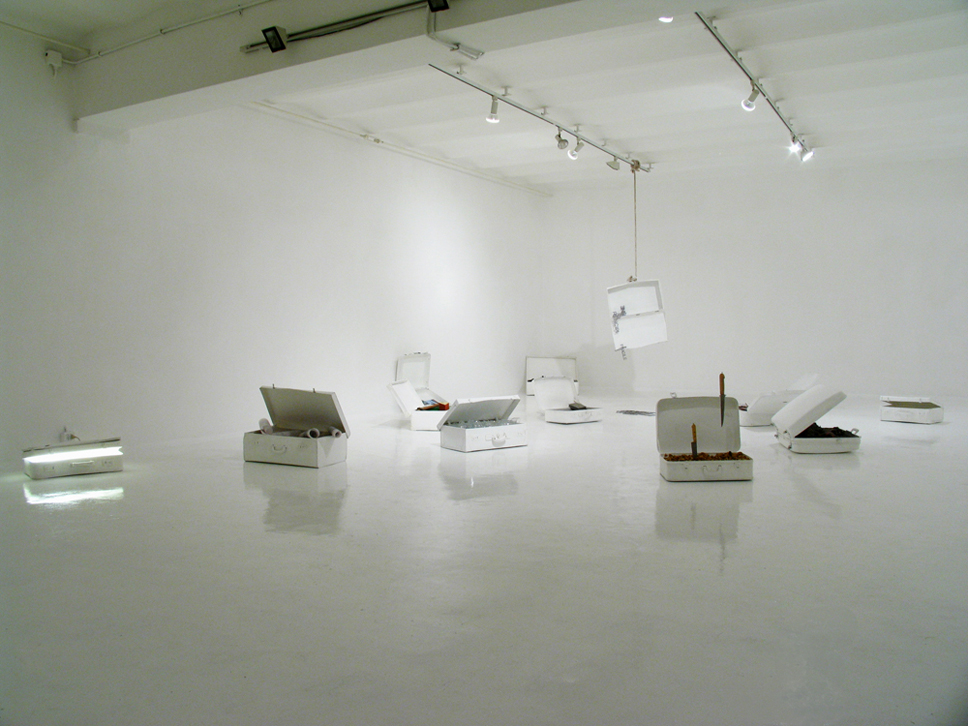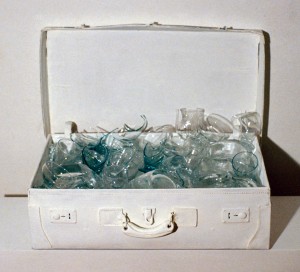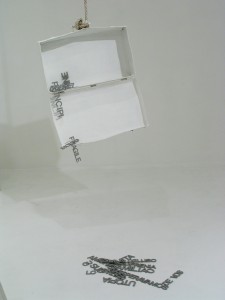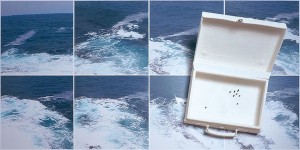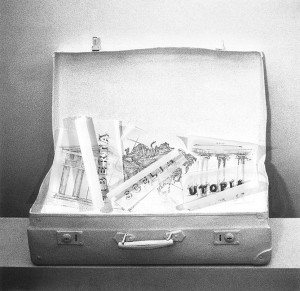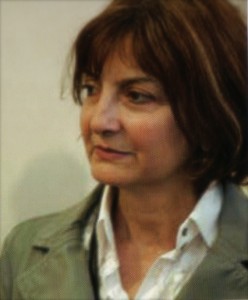“Derivas” (Driftings)
One of the two works of Fontenla that I describe in this text is an installation of suitcases, entitled ‘Derive’ a microcosm personal to Ines, but also an existential macrocosm of man. Some suitcases are open, others closed. Some are suspended in space as if from an existential gallows. In one are phrases written in various languages: Italian, of course, but also Spanish and English. It could be the suitcase of an emigrant, one who is a stranger abroad, but also at home. On the ground is another suitcase, it contains broken cups. They are the good things, the victories, but that have ended badly. In reality, the only certainty man has is precisely the end of things, even of the good ones, perhaps even of art. Sooner or later Death arrives, for all. Above another suitcase, like a sword of Damocles, hangs a knife. A drama. The savage atmosphere is that of the tango: fire, passion, love, sex, politics. Where persecuted and assassins live together with no possibility of escape. The suitcase is open, it permits us to look inside, to rifle through it with our eyes, to glance through its cracks with the corner of an eye. A kind of declaration. Voltaire wrote: “ My books are like chestnuts. The more you roast them, the more they sell.” The horrendous habit of burning books in order to cancel is part of the history of man. Man has a strange fear of the written word. The bonfires of the Nazis are only one fierce, cruel example of the destruction of consciousness. There could be many more. It is a matter of annulling memory, traces. It is no coincidence that Fontenla comes from a family involved in publishing. It is like an attempt at annulling one’s own history. The pages of the burnt book in the suitcase are those of “The memories of Hadrian” of Marguerite Yourcenar. The emperor Hadrian was born in Spain, sometimes one’s place of birth is no more than an entry in a register… Once more “Che” Guevara’s concept of “ Panamerica” comes to mind. Which is the place of Inés? Argentina? Italy? Europe? The place of her roots, her cultural references? With greater reason art is raised to a social and ethical instrument, well beyond self – reference; the discourse is wider, enlarged and extended and goes out to touch the territory of others. In the past, too, Inés has worked with plans and maps, with a certain need to find herself.
In the other suitcase are toys, they too burnt, phantoms of a painful childhood. They are the ashes of what is already dead of our existence, but which we continue to drag about, heavy as a suitcase of lead. A suitcase which haunts us, which we would like to leave behind in the boot of some taxi, or in the luggage-rack of some train. The burnt wings of the broken dreams are closely connected with the burnt temple of another suitcase. The impossibility of constructing a building, a temple which will last for eternity. And so it is the suitcase of the hemispheres, the one which contains the opposing elements that are in us: reason and emotion, goodness and wickedness. It is uncertainty that prevents us from flying, heavy as the powdered marble that is in another suitcase. In a kind of “Memento mori” that here becomes an invitation to tolerance, to forbearance and to existence itself, as free as possible from the fetters of our own history and of ignorance and distrust towards others.
Angela Madesani
Translation: Sandra Hancock
MIGRATIONS – Angela Madesani
When I think of the visit that I made a few months ago to the studio of Inés Fontenla in the heart of old Rome, I can’t help thinking of a work that is particularly in vogue at the moment The Diaries of a Motorcyclist , by Ernesto “Che” Guevara.
This is because these are very particular pages in the career of the great revolutionary: of a moment exquisitely youthful, with a slant more social than political. Where intimations of the future are vague.
The works of Fontenla of the last period are of a social mould, in spite of the strong autobiographical bias. And in her researches , as in the diaries of the “Che” – and this is the principal reason for my recalling them, is the experience of displacement and therefore of change , with the strength and the torment that are part of the culture of South America , and before that belonged to the Spanish and the Portuguese. Here , and there , is the experience of travel as profound change , which has as it starting point Argentina , complex and multi -facetted .
One of the two works of Fontenla that I describe in this text is an installation of suitcases , entitled ‘ Derive ‘ or ‘Driftings’ a microcosm personal to Ines , but also an existential macrocosm of man.
The use of suitcases has illustrious precedents :from the avantguard to Fabio Mauri to the more recent Peter Greenaway and Zoe Leonard , to name just a few.
In these suitcases there is a very particular situation. There is the story of a woman who has left behind her native land through an innate desire to flee its shadows and its memories , and arrives in the old continent , first in Spain , the home of her forebears , and then in Italy.
Some suitcases are open , others closed. Some are suspended in space as if from an existential gallows.
In one are phrases written in various languages : Italian, of course, but also Spanish and English.
It could be the suitcase of an emigrant , one who is a stranger abroad , but also at home.
On the ground is another suitcase , it contains broken cups. They are the good things , the victories, but that have ended badly. In reality , the only certainty man has is precisely the end of things, even of the good ones ,perhaps even of art. Sooner or later Death arrives , for all.
Above another suitcase , like a sword of Damocles , hangs a knife. A drama. The savage atmosphere is that of the tango: fire , passion , love , sex , politics. Where persecuted and assassins live together with no possibility of escape. The suitcase is open, it permits us to look inside, to rifle through it with our eyes, to glance through its cracks with the corner of an eye. A kind of declaration.
Voltaire wrote: “ My books are like chestnuts. The more you roast them, the more they sell.” The horrendous habit of burning books in order to cancel is part of the history of man .Man has a strange fear of the written word. The bonfires of the Nazis are only one fierce, cruel example of the destruction of consciousness. There could be many more. It is a matter of annulling memory, traces .It is no coincidence that Fontenla comes from a family involved in publishing. It is like an attempt at annulling one’s own history.
The pages of the burnt book in the suitcase are those of “The memories of Hadrian” of Marguerite
Yourcenar. The emperor Hadrian was born in Spain, sometimes one’s place of birth is no more than an entry in a register.. Once more “Che” Guevara’s concept of “ Panamerica” comes to mind.
Which is the place of Inés? Argentina? Italy? Europe? The place of her roots, her cultural references?
With greater reason art is raised to a social and ethical instrument , well beyond self – reference; the discourse is wider, enlarged and extended and goes out to touch the territory of others .In the past, too, Inés has worked with plans and maps, with a certain need to find herself.
Displacement is movement, flight. Inside another of the suitcases are the singed wings of angels, wings for the flight of the body, but also of the mind, – displacement, plans ,dreams which belong to the artist as to all men.
Or at least they should. Ours are not the times of dreams, they are times of disappointment, of broken utopias. Or rather ours, as in other times of decadence – think of the autumn of the Middle Ages – as Huizinga says, is the time of game-playing. A general rehearsal for Existence. The players are as always, however, the so – called “great” of the earth, putting at stake the lives of others.
In another suitcase are toys, they too burnt, phantoms of a painful childhood. They are the ashes of what is already dead of our existence, but which we continue to drag about, heavy as a suitcase of lead. A suitcase which haunts us, which we would like to leave behind in the boot of some taxi, or in the luggage-rack of some train.
The burnt wings of the broken dreams are closely connected with the burnt temple of another suitcase. The impossibility of constructing a building, a temple which will last for eternity. And so it is the suitcase of the hemispheres , the one which contains the opposing elements that are in us: reason and emotion, goodness and wickedness. It is uncertainty that prevents us from flying, heavy as the powdered marble that is in another suitcase. In a kind of “Memento mori” that here becomes an invitation to tolerance, to forbearance and to existence itself, as free as possible from the fetters of our own history and of ignorance and distrust towards others.
Beside the heaviness of the suitcases like a piece of Calvinist hardware , is the lightness of technology: a video entitled: “Power” An antithesis is thus created between the two means of communication compared one with the other.
In the video we see the feet of a man, wearing black shoes with laces, those worn by businessmen, that tread down the city with their force, – an archetypal city like Poussin’s. Above the shoes we can just see a pair of grey trousers, a kind of uniform of men of power. That power, colourless and shapeless, that crushes, suffocates, buries. The attempted moralisation of space, again like Poussin’s, is very close to that of the art which profoundly interests Fontenla.
Once again we return to the life plan of the emigrant – man – woman – artist – to their suitcases full of expectations but also of broken dreams. Feet shod in black pass over them , they crush and deafen with the burden , the arrogance , the heaviness of their weight. In all this there is a reference to our everyday experience of “ over communication”, to the diseased and chaotic information that besets us and makes us ill with anxiety and stress , in a world where wars are waged , but where even the most painful compromises are the order of the day.
No indifference; Trilussa too, almost a century ago arrived at the same conclusions . It is part of the history of man; that history which perhaps we should prefer not to know about , not to listen to.
It would have been simpler to film the military step of soldiers’ boots , but it would not have been so effective. The most pernicious power is the economic one , not the political nor the military; or rather arms are only a consequence.
The work of Inés Fontenla is against the tide ,created with the grace and enthusiasm that are always hers. It is her way of showing disdain , of saying “No” through the commitment , the strength , the authority of the Word which art possesses when it is truly art.
Translation: Sandra Hancock



